Healing Our Divides: Answering the Savior’s Call to Be Peacemakers
$17.95
by David B. Ostler
with a Foreword by Thomas B. Griffith
- “Healing Our Divides is the perfect book for our current moment. . . . Ostler teaches correct principles and then offers concrete tools and examples that will empower readers not just to believe in peace but to embody and practice it as well.” — Patrick Mason
- “No book has focused so clearly on how to face religious and ideological rivalry between people who earnestly believe they have the truth while the other does not.” — C. Randall Paul
- “An inspired call and practical guide. . . . Ostler makes a compelling case for the kind of sacrifice, humility, faith, and courage necessary for us to come together.” — Robert A. Rees
- “Ostler boldly steps into the fray with a book that instructs how to move back to the Christ-centered society that is—or was—central to the Latter-day Saint concept of a gathered Zion composed of the pure in heart, with all living in harmony and none excluded.” — Gregory Prince



Available in ebook for Kindle, Apple, Google Play, and, Kobo.
Also available through Deseret Book and Amazon.
Book Description:
Healing Our Divides: Answering the Savior’s Call to Be Peacemakers is a timely and essential guide for navigating the increasingly polarized and contentious landscape of modern society. Drawing inspiration from powerful and prophetic messages from Latter-day Saint leaders on unity and peace, author David B. Ostler explores the skills and approaches necessary to eliminate contention and become peacemakers. Through extensive research and personal reflection, Ostler offers concrete and practical strategies for reducing contention, understanding others, and fostering meaningful conversations amid differences in beliefs and ideologies.
Rooted in principles of religious discipleship and moral integrity, Healing Our Divides addresses the urgent need to confront societal division and hostility with love and understanding. Ostler delves into four major themes, including understanding today's divisions, learning practical approaches to reduce contention, recognizing peacemaking as a vital aspect of religious discipleship, and mastering the art of deep and meaningful discussion. With insightful thought boxes prompting self-reflection and engagement, as well as questions for group study, he invites readers to join in the communal effort of healing divides and fostering unity. This book serves as a poignant reminder of our collective responsibility to follow the teachings of Jesus Christ and work towards creating a more peaceful and harmonious world, one interaction at a time.
Comprehensive Table of Contents:
.
Foreword
Introduction: Becoming Peacemakers
Notes
1. Peacemaking, Opposition, and Love
No Contention Among Them
Opposition
Recognizing Contention
Difference and Division Are Everywhere
Does Avoiding Contention Simply Mean Going Silent?
How Divided Are We?
Notes
2. Spiritual Beings on a Physical Chassis
A Little About Our Brains and How We Think
Elephants and Riders
Filters and Models
How We Know Things
How We Form Our Worldview
What Is in One’s Worldview
Notes
3. Through a Glass, Darkly
Revising Existing Models and Creating New Ones
Confirmation Bias
Identity and Group Bias
Competency Bias
Emotional Bias
Confidence Bias
Contact Bias
Conspiratorial Predisposition
Additional Forms of Bias
Notes
4. To Act and Be Acted Upon
The Michael Scott Story
Subconscious Cognition is Well Studied
Social Media Algorithms
Political Messaging
Negative Conflict’s Effects
Immunity from Subconscious Manipulation
Notes
5. In the World but Not of the World
Go Ye into All the World
Preach the Gospel of Love
Maintain Self-care and Balance
The Ultimate In-group: All Are Children of God
Potential Conflicts Between Worldviews and Morality
Conflicts on Moral Issues
Spiritual Practices for Dealing with Difference
Weed Out the Bitter Root
Practice Empathy and Compassion
Be Humble about Our Certainty
Listen with Curiosity, Seek to Understand
Notes
6. Preparatory Tools
Set Your Conversation Goals
Goal: Build Connection and Relationship
Goal: Learn from Others
Goal: Change Others’ Opinions and Beliefs
Goal: Come to Agreement
Complimentary Goals
Ineffective and Counterproductive Goals
Assess Potential Disagreement
Sphere of Consensus
Sphere of Legitimate Controversy
Sphere of Deviance
Determine the Potential Cost
Costs within Our Groups
Impact in Our Families
Costs to Ourselves
To Pay or Not to Pay
Create the Right Setting
Find and Use Reliable Information
Prepare Emotionally
Notes
7. Conversation Tools
Bring People into Our Group
Dignify
Model Good Conversational Techniques
Obtain Permission
Ask Curious Questions
Use Cognitive Empathy
Separate Fact and Opinion
Use the Eavesdropper Test
Articulate Others’ Beliefs
Find Agreement and Common Ground
Pause
Discussing Conspiracy Theories
End or Withdraw
Notes
8. Real Life Examples
Discussing Religious Beliefs in a Family
Respectfully Exploring Someone Else’s Opinion
Discussions in the Sphere of Deviance
Getting Together with Friends
Politics and Social Issues on Social Media
Notes
9. Practice Makes Perfect
Practice Listening
Ask Curious Questions
Try Cognitive Empathy
Take the Ideological Turing Test
Practice In-grouping
See Extremism and Mistakes in Your Group
Ask Questions on Social Media
Evaluate Your Media
Find Common Ground
Plan Ahead
Get Comfortable with Mistakes
Notes
10. Visions
The Common Good
Within Communities of Faith
Our Responsibility to Others
The Utah Compromise
Accommodation versus Winner-Takes-All
Covenantal Pluralism
Being True To Our Values
Possible Futures
Notes
Conclusion: Press Forward, Saints
Reasons to be Hopeful
If Not Us, Then Who?
Ourselves
Our Families
Our In-groups
And Beyond
Our Unique Opportunity
Ever Outward
Notes
Ideas for Book Groups
Note
Resource Guide
Books
Introductory Books
Additional Books
Resources for Children
Joining with Others
Works Cited
Index
Q&A with the Authors:
.
Q: What inspired you to delve into the topic of peacemaking and healing divides, particularly within the context of religious and political polarization?
A: Bridges taught me that we have real limitations on understanding why people believe differently and how we relate to them. Although Bridges was about people who no longer believe in traditional LDS beliefs, I saw that this applies to other beliefs, particular about politics. I’ve seen how people are affected by the division and contention coming from different beliefs. I see families, congregations, and communities divided by different. I worry that our alienation is increasing causing us to separate into different groups unable, or unwilling, to engage with others.
Q: Could you elaborate on the challenges you faced while researching and writing the book, especially in terms of navigating differing perspectives and potential biases?
A: One challenge was seeing how natural it is to be caught up in difference and my own natural tendency to bias and contention. I don’t think I will ever get over it, maybe none of us will, but I found that I have a lot of work to do. I worry that people that know me well, will dismiss this message because they know I am still a work in progress.
As I studied Latter-day Saint teachings about contention, I struggled to know what I should do overcome contention in my own life. I questioned whether it was just better to retreat from these issues. But, I realize that the very issues that are most contentious are the ones that are the most important. It was hard for me to decide that part of being a peacemaker is to be engaged in the messiness of these different beliefs.
As I studied and wrote, I realized that I had very few tools to help me when I choose to engage. What did I need to do so that I could stay in the room with difference? Could I find ways to better understand why someone could believe something completely different than me? Could I respect someone who is my ideological opposite? I realized that I needed tools and I didn’t have them. I found some resources that had practical tools, but I realized that just understanding them academically wasn’t enough, I needed to engage with others and that would take me to settings with conflicting ideas. Often, I found that despite my best efforts, I couldn’t step back and remember tools. But, over time, I found that I could better remember and use those tools. I’m still trying, which is something we all need to do.
Q: Your book emphasizes the importance of understanding and respecting differing beliefs while fostering meaningful discussions. How do you suggest individuals approach conversations about contentious issues without furthering division?
A: Healing Our Divides gives some simple tools that all of us can use. I’m sure that there are others, but these ones worked for me. I think readers can find and learn a couple of tools that will work for them. I even give readers exercises where they can work with another, perhaps a friend or family member, to practice and try out these skills. If we can try, we will get better. Yes, we will make some mistakes and need to apologize and reset, but in the process, we will learn and provide examples to others that we can have positive discussions.
Q: In your research, what concrete approaches or skills did you find most effective in reducing contention and building bridges between individuals with differing viewpoints?
A: In-group bias is someone all of us feel. When we think of someone as in our group, we generally think of them more charitably. When we think of them as not in our group, we think of them more skeptically. If I am interacting with someone who beliefs or supports policies I don’t agree with, this bias means that I am naturally alienated from. In some situations, this can be defining. We might even label them in our mind with a negative political or religious label. This is reductive and alienates us. If we express it to another, it hurts them. But there are ways to eliminate this in-group bias. We simply keep a common identity in our mind. Instead of thinking about them in context of our difference, we can label them in our minds, as a brother, or mother, or a friend, or a child of God. With this commonality, we lose defensiveness and skepticism and find charity and connection. Likewise, we can refuse to use or think about another with any negative labeling, including words like brain washed, apostate, right wing nut job or America hating liberal. If we can see the divinity of another and the commonality we should all feel as children of God, we will see others in that light. It’s hard to be contentious with another how we dignify through their divine parentage.
Q: As a member of the Latter-day Saint community, how do you see the teachings and principles of the Church contributing to the efforts of peacemaking and healing divides, both within and outside the faith?
A: I was surprised at how many of our general Latter-day Saint leaders have condemned contention and today’s polarization and alienation. They clearly see how these forces are affecting not only Latter-day Saints, but our communities.
In April 2023, President Nelson taught that discipleship includes peacemaker. In his talk, Peacemakers Wanted, he said, “Brothers and sisters, we can literally change the world—one person and one interaction at a time. How? By modeling how to manage honest differences of opinion with mutual respect and dignified dialogue.” He believes that peacemaking can change the world. I think he is very aware of the fractures that existing in families, congregations and societies as a whole because of today’s curse of polarization and contention.
Q: Your book emphasizes the communal nature of healing divides and becoming peacemakers. How do you envision individuals and communities actively engaging with the concepts presented in your book to create positive change in their spheres of influence?
A: Most peacemakers are going to influence just a few, likely with family members and a few friends. That can create a multiplier effect where those they touch end up touching others. I’m optimistic that this translates into a rejection and weakening of the forces that want to divide us further. There will be some that can organize in their communities or join and support peacemaking organizations. Perhaps there will be an issue that divides their community, and they can be peacemakers and help find effective ways to discussion these issues and find solutions that consider others and their concerns and needs. President Nelson said, “peacemaking is a choice.” When any of decides to be a peacemaker, we make a better world. It might be just in our families, or in how we help our children live in a contentious world, but it might also be in our communities. If enough of us decide to be peacemakers, we can prevail against what at times seems like unstoppable division and contention.
Praise for Healing Our Divides:
“No book has focused so clearly on how to face religious and ideological rivalry between people who earnestly believe they have the truth while the other does not. David Ostler has searched sources in social-psychology and comparative theology to present wise advice for (mostly) enjoying life with those who disagree with us. He ends with this potent truth from John Templeton that should be an addendum to the Latter-day Saint 13th Article of Faith: 'Why settle for [religious encounters] based on tolerance alone? More than tolerance, we need constructive competition. When persons on fire with their gospel compete lovingly to give their finest treasures to each other, will not everyone benefit?'” — C. Randall Paul, President, Foundation for Religious Diplomacy
“Healing Our Divides is the perfect book for our current moment. There is an urgent need for Latter-day Saint Christians to become better peacemakers—in our homes, workplaces, congregations, communities, and nations. David Ostler teaches correct principles and then offers concrete tools and examples that will empower readers not just to believe in peace but to embody and practice it as well.” — Patrick Mason, co-author of Proclaim Peace: The Restoration’s Answer to an Age of Conflict
“Father Lehi taught the principle that there must needs be opposition in all things, with our mortal experience purposely designed to create constant conflict. In Healing our Divides, David Ostler masterfully explores how we can embrace disagreement while reducing or eliminating contention. Ostler builds upon his first book Bridges by providing practical advice and techniques in how to communicate effectively by broadening our ‘in-group’ to include all of God’s children, and he demonstrates how we can maintain our standards, understand our biases, and discover how to love those whose views differ from our own. The renowned scientist and Jesuit Priest Pierre Chardi said, ‘Someday, after mastering the winds, the waves, the tides and gravity, we shall harness for God the energies of love, and then, for a second time in the history of the world, man will have discovered fire.’ Ostler’s book gives us the blueprint in how we can do this.” — Richard Ferguson, Executive Director, Scripture Central
“At present, the United States is becoming irreparably divided, a nation that will not stand or survive unless as citizens we choose to start listening to, reaching out to, and loving those on the other side of our personal and national divides. David Ostler’s Healing Our Divides: Answering the Savior’s Call to Be Peacemakers is an inspired call and practical guide for doing just that. Using the words of scriptures, sages, and modern prophets, as well as the wisdom of our common humanity, Ostler makes a compelling case for the kind of sacrifice, humility, faith, and courage necessary for us to come together. The American Dream will remain a dream as long as there are deep divisions among us. As Ostler says, “Nothing gets better until enough of us decide we want to make it so.” Get this book. Follow its wisdom. Become a uniter. The dream awaits!” — Robert A. Rees, Co-founder and Vice-President, Bountiful Children's Foundation
“The focus ofHealing Our Divides: Answering the Savior’s Call to Be Peacemakersis perhaps the greatest danger facing American democracy and, indeed, democracies throughout the world: the disintegration of civilized discourse and behavior into cultural wars that threaten to shred the very fabric of democratic society. David Ostler boldly steps into the fray with a book that instructs how to move back to the Christ-centered society that is—or was—central to the Latter-day Saint concept of a gathered Zion composed of the pure in heart, with all living in harmony and none excluded. Ostler is not the preacher on a high platform who is scolding the congregation, but rather, a thoughtful teacher who guides us through his syllabus gently and informatively, and along the way continually inserts suggestions for further thought and action. In doing so, he has cast a wide net to pull in references to support his guidance, evidenced by over 250 footnotes that, while paying homage to Latter-day Saint Church leaders, go well beyond the LDS literature. He first lays the groundwork for understanding human psychology, and then builds upon that foundation to instruct the reader on practical measures to build peacemaking skills individually and collectively.” — Gregory Prince, author of David O. McKay and the Rise of Modern Mormonism
“I have witnessed few people strive to create a healthy conversation and understanding as David Ostler. This is why I was excited about this book, Healing Our Divides, to further establish peacemaking in our communities. I pray you not only read this book but also take advantage of applying these important principles within your community. David's book and resources make it easy to take the initial steps of uniting together and becoming peacemakers. Let's start a healing conversation.” — Kurt Francom, Executive Director of Leading Saints
“David Ostler’s new book, Healing Our Divides: Answering the Savior’s Call to be Peacemakers . . . is rather timely. Within its pages, Ostler attempts to offer a guide to how we, as members of the church and as American citizens, might begin to ‘be peacemakers’ and ‘model how to manage honest differences of opinion with mutual respect and dignified dialogue,’ and he largely succeeds.” — Zach Stevenson, Utah Monthly
About the Author:
David B. Ostler has lived and served on four continents as a bishop, stake president, mission president, and director of a Church historical site and visitors' center. He has a BA in quantitative methods from the University of Utah and an MBA from Dartmouth College. He retired from a thirty-year career managing domestic and international businesses focused on improving health care through data analytics, consulting, software, and business services. Married to Rachelle, they have six wonderful children who have a wide range of different religious and political beliefs. They split their time between homes in Northern Virginia and Midway, Utah. His first book is Bridges: Ministering to Those Who Question.
More Information:
195 pages
ISBN: 978-1-58958-774-8 (paperback)
Press sheet

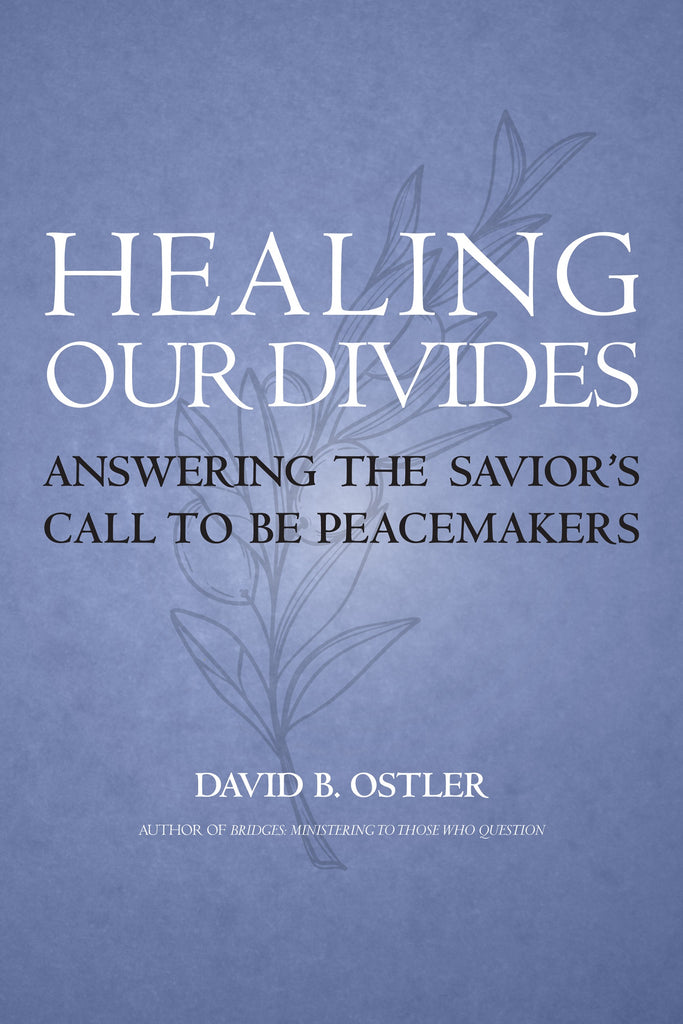



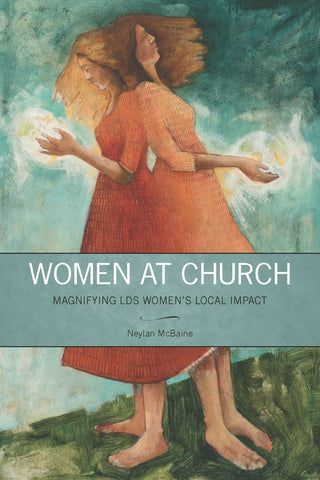
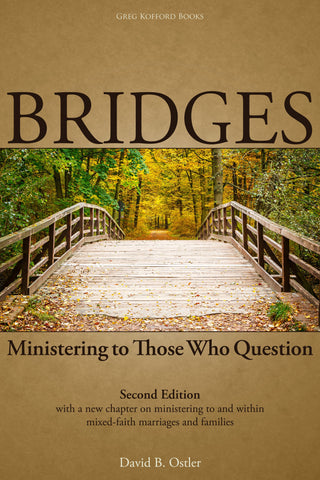
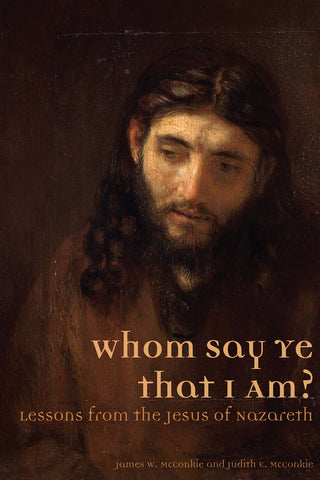
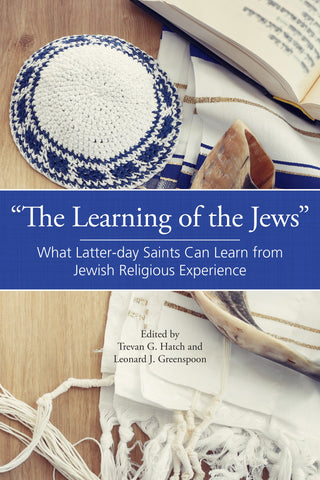
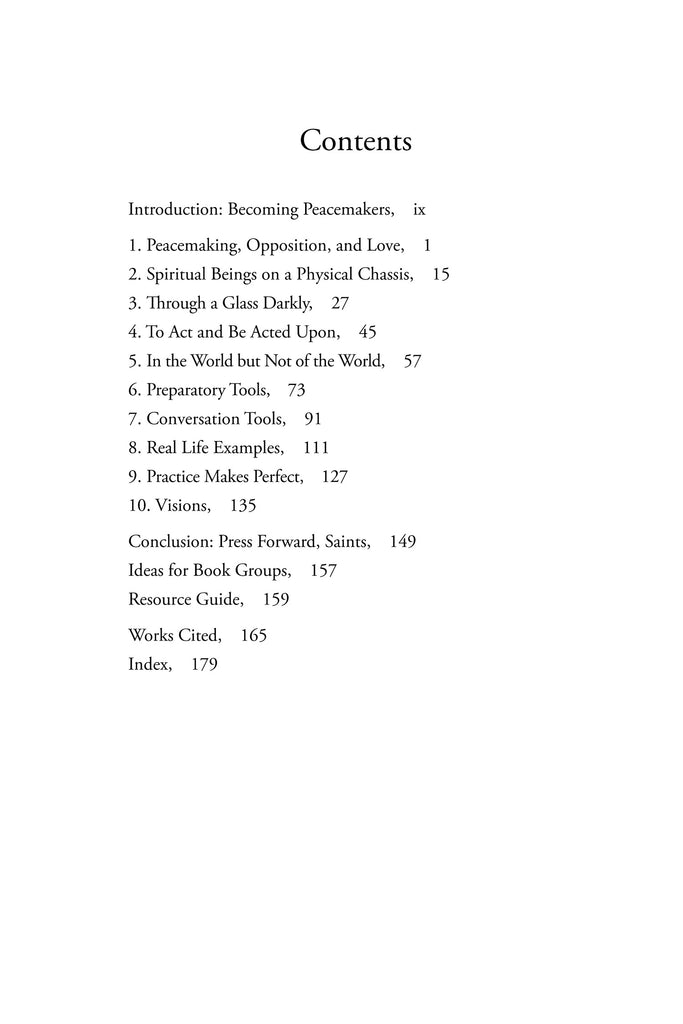
Share this item: